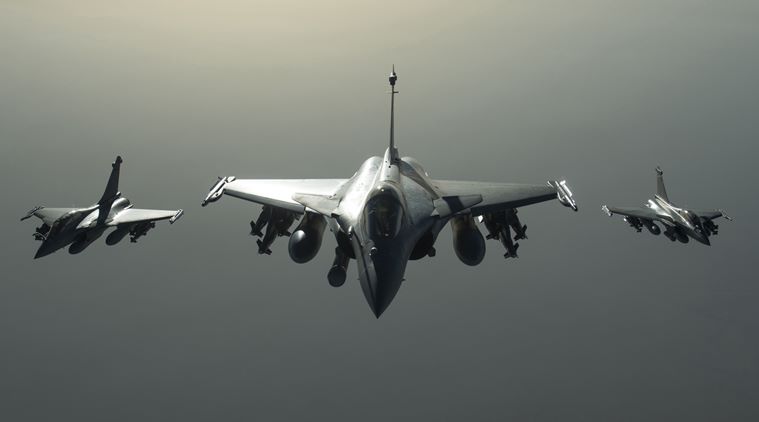
Seeking dismissal of a petition which sought review of the Supreme Court’s December 14, 2018 order that dismissed PILs for a probe into alleged irregularities in the Rafale deal, the government Wednesday told the top court that certain documents submitted by the review petitioners were “sensitive to National Security” and their “unauthorized photocopying and leakage” constituted “penal offences under the Indian Penal Code including theft”.
The government affidavit, filed by Defence Secretary Sanjay Mitra, said since the review petition was “in public domain” and “available to the enemy/our adversaries”, national security had been put “in jeopardy” because the documents relate to “war capacity of combat aircraft”. The affidavit sought removal of these documents from the records.
The affidavit referred to a four-page “secret” note attached with the review petition filed by former Union Ministers Yashwant Sinha, Arun Shourie and advocate Prashant Bhushan as well as an application filed by them seeking perjury charges against the government, and said they were “using” it “with the intention to present a selective and incomplete picture of internal secret deliberations on a matter relating to National Security and Defence”. It said Bhushan authenticated these documents as true copies of the original.
The affidavit was filed exactly a week after Attorney General K K Venugopal, making submissions in the Supreme Court, threatened to invoke the Official Secrets Act and initiate “criminal action” against two publications and a lawyer. He initially did not name the publications but towards the end of the hearing said “documents in the possession of The Hindu and ANI are stolen documents”.
On February 8, a report in The Hindu, citing a “Defence Ministry note” of November 2015, had stated that the Ministry of Defence “raised strong objections to ‘parallel negotiations’ conducted by the Prime Minister’s Office (PMO) with the French side” in the Rafale deal. ANI released the same note with additional notings.
At the last hearing, when Venugopal told the court that the matter was one involving national security and stolen material could not be relied upon unless the source was established, the bench asked him “suppose a crime like corruption has been committed, can you seek shelter under national security to suppress it?” Justice K M Joseph said “stolen material can be relied upon provided it’s relevant” and “what I am trying to say is you cannot have a general proposition” that it cannot be used.
Venugopal’s remarks about invoking OSA and initiating “criminal action” were condemned by press associations, including The Editors Guild of India, Press Club of India, Indian Women Press Corps and Press Association, as “reprehensible… threats” with the “potential of sending out a chilling effect to one and all in the media”.
A day later, Venugopal did a U-turn, saying “the statement that files have been stolen is wholly incorrect” and that the review application had annexed documents which were photocopies of the original.
The government affidavit filed Wednesday stated that these documents were unauthorisedly photocopied and leaked “without consent, permission or acquiescence of the Central Government” and “those who have conspired in making the photocopy of these sensitive documents and annexing it to the Review Petition/ Misc. Application and thereby committing theft… have adversely affected the Sovereignty, Security and Friendly Relations with the foreign countries”.
It said “secrecy was envisaged in the various agreements” that the government “had entered into with the concerned Foreign Government and others concerning matters of National Security” and that the “the petitioners and the deponent of the affidavit of the Review Petition are guilty of leakage of sensitive information, which offends the terms of the agreements”.
“These matters are now a subject of an internal enquiry which has commenced on 28.02.2019, and it is currently in progress,” it said, adding “in particular, it is of utmost concern to the Central Government to find out where the leakage took place so that in future the sanctity of decision making process in governance is maintained”.
The review petitioners, the government said, “have no authority whatsoever to produce the same before this Hon’ble Court without the explicit permission of the Government of India, Ministry of Defence.” It said the documents were exempt from disclosure under Section 8 (1) (a) of the Right to Information Act, 2005,and these should be removed “from the record of the Review Petition and Misc. Application” and they be dismissed.
The government also submitted to the Supreme Court a copy of the CAG report on the Rafale aircraft purchase.